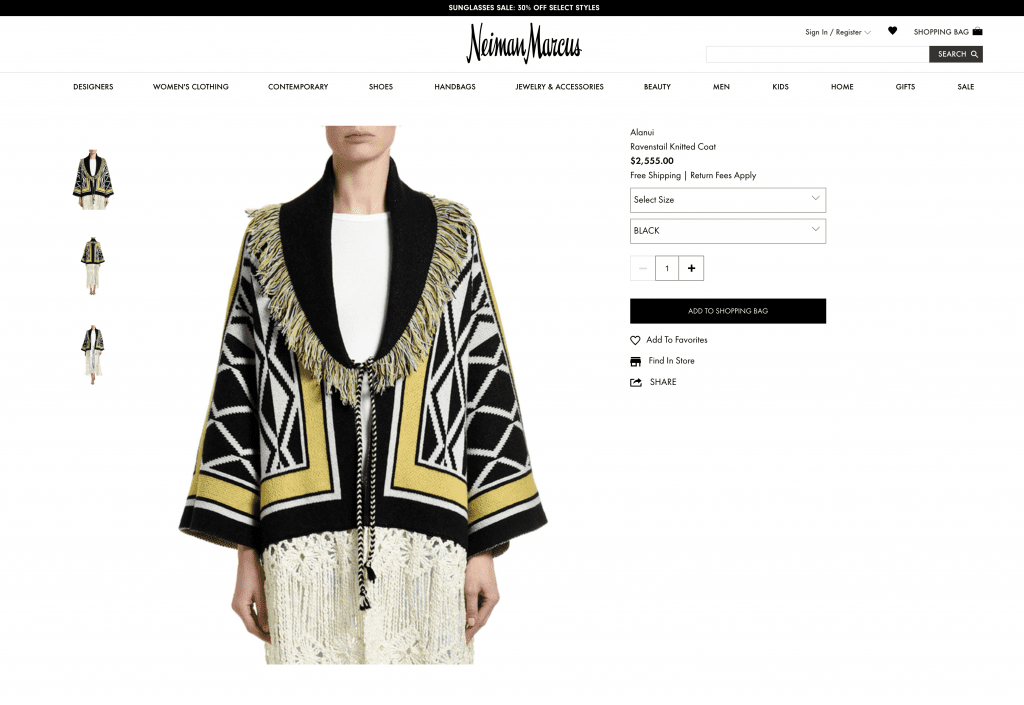Neiman Marcus Groupand its subsidiary MyTheresa want the lawsuit filed against them for selling a sweater that allegedly ripped off a pattern associated with Native American groups tossed out of court. In a motion to dismiss filed on September 14, counsel for Neiman Marcus Group, Inc. (“NMGI”) and MyTheresa argues that the plaintiff, the Sealaska Heritage Institute, Inc. (“SHI”) – a nonprofit “established to perpetuate and enhance the Tlingit, Haida, and Tsimshian cultures of Southeast Alaska” – lacks the requisite jurisdiction to include them in a suit over Alanui’s $2,500-plus Ravenstail Knitted Coat.
According to the complaint that it lodged against NMGI and MyTheresa in April 2020, which was subsequently amended to include Milan-based fashion brand Alanui and its founder Caroltta Oddi, as well as its owner the buzzy New Guards Group, and New Guards’ parent company Farfetch, SHI claims that the respective defendants are on the hook for manufacturing and/or selling a sweater that makes unauthorized use of a copyright protected pattern.
More than that, though, the defendants allegedly co-opted the “Ravenstail” name, which refers to a “specific, defined, and famous style of weaving and pattern” that is associated with Native American groups, namely, the Tlingit, Haida, and Tsimshian.
Due to the “substantial copying” embodied in the Alanui sweater, which comes directly from a woven piece of art, called “Discovering the Angles of an Electrified Heart” created by “Alaska Native resident” Clarissa Rizal, SHI claims that the defendants not only violated federal copyright law but have also run afoul of the Alaska Unfair Trade Practices and Consumer Protection Act, and engaged in False Designation of Origin, as well, thanks their use of the “Ravenstail” name.

In response to the amended complaint, NMGI and MyTheresa claim that SHI’s “hollow labels and vague group pleadings” that aim to establish personal jurisdiction over them fall flat. “Tellingly, [SHI] alleges that the ‘defendants’ are subject to personal jurisdiction in Alaska because they ‘misappropriated intellectual and other property directly from the plaintiffs who are located in this judicial district.’” But … NMGI claims, SHI’s “subsequent allegations exclude NMGI and MyTheresa from the alleged copying, attributing it to other defendants instead,” namely, Alanui, Ms. Oddi, New Guards, and Farfetch.
“The plaintiffs do not actually allege that NMGI stole, advertised, offered, or sold any coats,” the retailer asserts. “Indeed, it is beyond dispute that NMGI is a holding company that does not conduct retail sales operations of any kind.”
With that in mind, Neiman Marcus asserts that the court lacks “specific jurisdiction over” it and MyTheresa because it was SHI that “placed orders with NMGI and MyTheresa to send [the] infringing coats to this District.” And even if SHI had “plausibly alleged that NMGI undertook any of the specific acts described in the amended complaint,” Neiman Marcus and MyTheresa assert that the “allegations [do] not support jurisdiction over NMGI or MyTheresa because they rely solely on the plaintiffs’own conduct.”
Ultimately, they argue that if the court does not opt to dismiss them from the case, it should transfer the matter from a federal court in Alaska to the U.S. District Court for the Southern District of Texas with reference to the U.S. Bankruptcy Court for the Southern District of Texas, the latter of which “has already been tasked with administering pre-petition claims against” Neiman Marcus, which filed for Chapter 11 bankruptcy in May.
*The case is Sealaska Heritage Institute, Inc., v. Neiman Marcus Group LTD, LLC, et al, 1:20-cv-00002 (D. Alaska).











